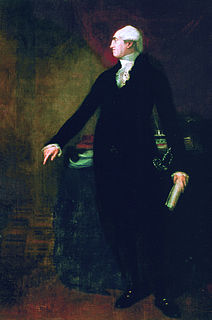Related Research Articles
Joseph Devonsher Jackson PC was an Irish Conservative MP in the United Kingdom Parliament and subsequently a Judge.
Robert Richard Warren PC, QC was an Irish Conservative Party Member of Parliament (MP) in the United Kingdom Parliament and subsequently a Judge.
John Gore, 1st Baron Annaly PC (Ire) was an Irish politician and peer.
Stephen Woulfe was an Irish barrister and Whig politician. He served as Solicitor-General for Ireland, 1836 and as Attorney-General for Ireland in 1838;. He was the first Roman Catholic to be appointed Chief Baron of the Irish Exchequer. He died young, due to a combination of chronic ill-health and overwork.
Sir Richard Levinge, 1st Baronet was an Irish politician and judge, who played a leading part in Irish public life for more than 30 years.
Sir Maziere Brady, 1st Baronet, PC (Ire) was an Irish judge, notable for his exceptionally long, though not particularly distinguished tenure as Lord Chancellor of Ireland.
Henry Singleton (1682–1759) was an Irish politician and judge, who is remembered now mainly for his friendship with Jonathan Swift, and for his notable acts of charity during the Great Irish Famine of 1740-1, in which between 300,000 and 500,000 people died. Singleton House, his impressive townhouse in Drogheda, no longer exists.
William Whitshed (1679–1727) was an Irish politician and judge who held office as Solicitor-General and Lord Chief Justice of Ireland; just before his death he became Chief Justice of the Irish Common Pleas. He became the Member of Parliament for Wicklow County in 1703, and was appointed as Solicitor-General in 1709; he was Lord Chief Justice 1714-1727. He is mainly remembered for the hatred felt for him by Jonathan Swift, who among many other insults called him a "vile and profligate villain", and compared him to William Scroggs, the English Chief Justice of the 1670s, who was notorious for corruption. The principal cause for this was the trial of Edward Waters, Swift's publisher, for seditious libel, where Whitshed's conduct of the trial was widely condemned as improper, and Whitshed's unsuccessful efforts to have another publisher indicted for bringing out The Drapier Letters.
John Doherty, Q.C. (1785–1850) was an Irish politician, Solicitor-General for Ireland and senior judge, who became Chief Justice of the Irish Common Pleas.
Henry George Hughes was an Irish judge, politician, and third Baron of the Court of Exchequer. In 1850 he was appointed Solicitor-General for Ireland. He was elected Member of Parliament (MP) for Longford in 1856.
Jonathan Christian, SL, QC, PC (I), was an Irish judge. He served as Solicitor-General for Ireland from 1856 to 1858. He was a judge of the Court of Common Pleas (Ireland) from 1858 to 1867 when he was appointed Lord Justice of Appeal in Chancery. On the creation of the new Irish Court of Appeal in 1878 he served briefly on that Court, but retired after a few months.
Robert Hellen was an Irish politician, Solicitor-General, and judge of the Court of Common Pleas (Ireland).
Marcus Paterson was an Irish politician, Solicitor-General for Ireland and Chief Justice of the Irish Common Pleas. He became the Member of Parliament for Ballynakill in 1756 and Lisburn in 1768. He was appointed as Solicitor-General in 1764 and became Chief Justice of Common Pleas in 1770. He held office until his death although he had been contemplating retirement due to ill health.

Warden Flood was an Irish judge who held office as Lord Chief Justice of Ireland, but is mainly remembered now as the natural father of the statesman Henry Flood.

John Bathe was an Irish barrister and judge. He was a member of a famous legal dynasty, and had a distinguished career under the Tudors, holding office as Solicitor General for Ireland and Chief Justice of the Irish Common Pleas.
Sir Thomas Luttrell was a wealthy Anglo-Irish landowner of the sixteenth-century Irish Pale. He was also a distinguished lawyer and judge who held the offices of Solicitor General for Ireland and Chief Justice of the Irish Common Pleas.
Patrick Barnewall was a leading figure in the Irish Government of the 1530s and 1540s. He owed his position largely to his close links with Thomas Cromwell. He sat in the Irish House of Commons as MP for Dublin County, and held the offices of Solicitor General for Ireland and Master of the Rolls in Ireland. Today he is mainly remembered for his role in founding the King's Inns. He belonged to a junior branch of the family of Lord Trimlestown: his own descendants held the title Viscount Barnewall of Kingsland.
Sir James Dowdall was an Irish judge of the Elizabethan era who briefly held office as Lord Chief Justice of Ireland. He should not be confused with James Dowdall, the Catholic martyr, who was his cousin.

Godfrey Boate (1673-1722) was an Irish judge: he is mainly remembered now for incurring the enmity of Jonathan Swift, who commemorated Boate's death with the mocking Quibbling Elegy on Judge Boat.
Thomas Tennison was an Irish politician and judge. He served as Prime Serjeant and as a judge of the Court of Common Pleas. He also sat in the Irish House of Commons as member for Dunleer.
References
- ↑ Leigh Rayment's historical List of Members of the Irish House of Commons cites: Johnston-Liik, Edith Mary (2002). The History of the Irish Parliament 1692-1800 (6 volumes). Ulster Historical Foundation.
- ↑ F. Elrington Ball (2005). The Judges in Ireland, 1221-1921. The Lawbook Exchange, Ltd. ISBN 9781584774280 . Retrieved 31 December 2010.
- ↑ Ball p.217
- ↑ Ball p.163
- ↑ Ball p.217
- ↑ Ball p.163
- ↑ Ball p.217
- ↑ Ball pp.163-4